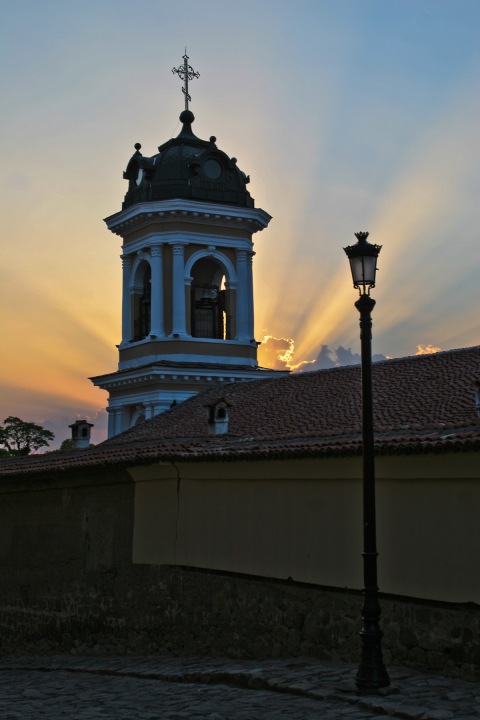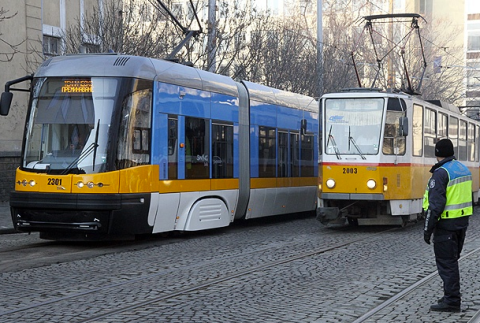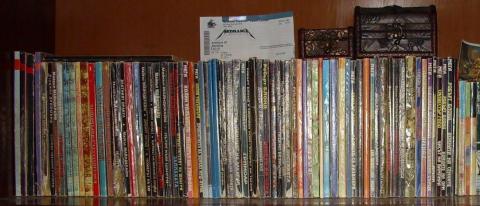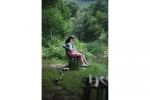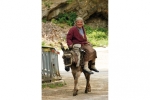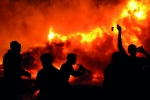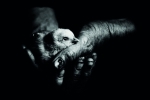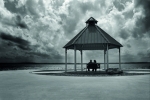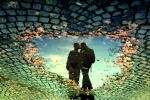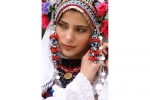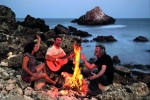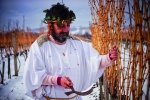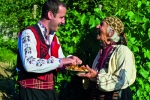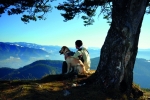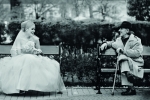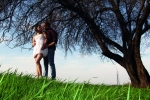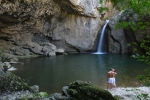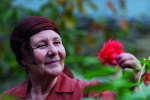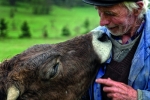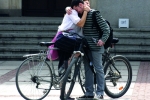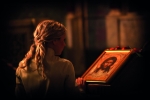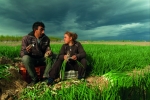Bulgarian Icons – The End of History
08.09.2014 § 2 Comments
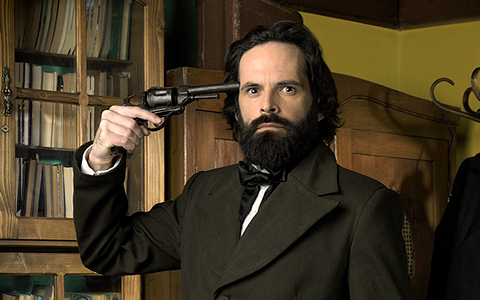
Photographer Lyubomir Sergeev asks a painful question: would the treasured heroes of Bulgaria’s past stab themselves in the heart or shoot themselves if they could see what their country is like today? In painstaking detail, he recreates the dress and time periods of six great Bulgarian men and creates a new kind of portrait: one that not only inspires, but also forces us to think harder, to be better.
A Tribute to Valeri Petrov
28.08.2014 § 1 Comment
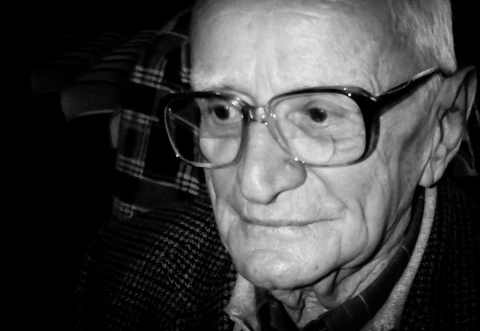
On August 27, 2014 we lost the poet Valeri Petrov. The writer, the translator, the humanist, the thinker, the example Valeri Petrov.
And oh! So gorgeous-starry was the night,
That our everyday plights,
Vain, summery,
Fleeting,
With their “Wonderful”s, “Hurrah”s and “Bravo”s,
Head over heels took off, retreating.
…
For I felt large under the starry dome
– and are we naught but atoms with no goal? –
And all around was peace and calm,
And beauty filled my soul.Valeri Petrov
With his poetry, he could make us laugh and cry within a single stanza, experience the chill of autumn or the breath of spring. In translating Shakespeare, he laid out the staggering beauty of Bulgarian verse before us and created something more: the stories and images of the Bard in our own melodious tongue. With the script for “Knight Without Armour” (YouTube link), he put his finger on our worst societal sores through the eyes of a carefree, as-yet-unburdened child. With “Five Tales”, he gave our children mountains, deer friends and the ocean floor to imagine and explore. He never grew up, and yet his genius never faltered, never waned, until the end.
Plovdiv at Night
23.08.2014 § Leave a comment
Plovdiv is a great city to visit, famed for its Revival-era old town and Roman past but, especially in the summer, midday lighting makes for some very harsh looking photos. This is doubly true for inexperienced amateur photographers without the proper filters like myself. In a quest to soften the glare, I set out on a picture-taking excursion at dusk in late August. Not only did I capture some lovely evening/night colours, but I saw the city in an entirely new light…darn, wait, that’s a bad pun. I saw it through a new lens. No, that won’t do either. It was lovely, okay?!
Graffiti Art Graces Sofia’s Classic Trams
06.06.2014 § 2 Comments
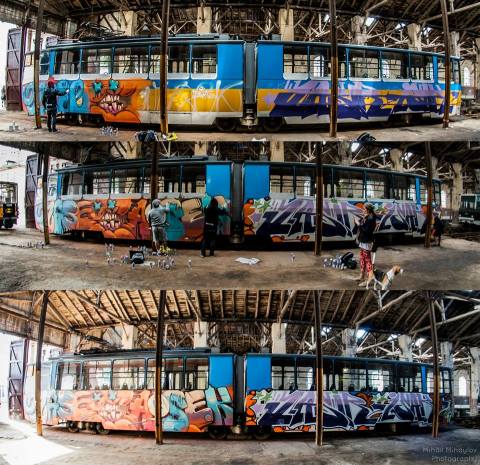 As a resident of Toronto, I have been closely following the ordering, testing and politics surrounding the fleet of new low-floor, double-capacity TTC streetcars. Across the Atlantic, where full-fledged streetcar networks are far more common, the Bulgarian capital Sofia is in the process of replacing some of its classic (i.e., aging) streetcars (also known as trams or трамваи/tramvai in Bulgarian) with Polish-built articulated units. Back in January, the first one was symbolically put into exploitation to mark the 114-year anniversary of the opening of the first Sofia tram line.
As a resident of Toronto, I have been closely following the ordering, testing and politics surrounding the fleet of new low-floor, double-capacity TTC streetcars. Across the Atlantic, where full-fledged streetcar networks are far more common, the Bulgarian capital Sofia is in the process of replacing some of its classic (i.e., aging) streetcars (also known as trams or трамваи/tramvai in Bulgarian) with Polish-built articulated units. Back in January, the first one was symbolically put into exploitation to mark the 114-year anniversary of the opening of the first Sofia tram line.
However, as exciting as the new trams are, I was delighted to discover another interesting development. In tune with its bid for European Capital of Culture (for which it competes with three other Bulgarian cities: Veliko Tarnovo, Plovdiv and Varna), Sofia has initiated a brilliant public art project. On June 1, 2014, as part of the city’s youth art festival ZONA CULTURA, a dozen of the current system’s yellow-and-white trams were painted by various graffiti artists before returning to circulation. This is a welcome change of pace, as it gives graffiti artists a very daring showcase, instead of whitewashing their works on sight. It also reserves for art visual space that is all too often (khm-khm, Toronto) used for advertising decals.
Plovdiv: A Promotional Video
11.02.2014 § 2 Comments
Created by the Operational Program “Regional Development”, this video is a perfect companion to my posts about Plovdiv, Bulgaria’s second largest (and oldest) city. As a bonus, you get to hear some narration in Bulgarian, with English subtitles.
Communism in a Song
16.10.2013 § Leave a comment
I have written a bit about the Socialist period in Bulgaria, and there is no doubt that it is the defining political stage in the history of modern Bulgaria. Twenty-five years after its 45-year span ended, we are still divided into “reds” and others, and we are still struggling to “transition” to a free-market economy. While my opinions on the subject will be nothing new to either side, I would like to take a look at the immediate implications of the onset of Communism in Bulgaria through an unlikely source of data.
Emil Dimitrov, whom I have mentioned in the Music section of this blog, wrote a beautiful song called “A Letter to Mom” (“Писмо до мама”) in 1974. In listening to it a few days ago, I realized that it encapsulated so much of the sweeping changes brought forth by Bulgaria’s Communist decades. This song, while being entirely non-political and written as a sentimental ballad honouring one’s mother, offers glimpses at the themes that were current in Bulgarian society in the 1970’s. Here are the lyrics, each stanza followed by my commentary.
A Letter to Mom
O what a bride you must have been, dear mommy
So clean, so sparkling was your father’s yard
When they led you out onto the threshing floor
To link hands with your groom in bridal dance
Protest Poetry #6: “The fight is hard and pitiless”
04.08.2013 § Leave a comment
Bilingual poetry in support of the protests in Bulgaria. English version from Anthology of Bulgarian Poetry (translated by Peter Tempest)
The fight is hard and pitiless
The fight is hard and pitiless.
The fight is epic, as they say.
I fell. Another takes my place –
Why single out a name?
After the firing squad – the worms.
Thus does the simple logic go.
But in the storm we’ll be with you,
My people, for we loved you so.
2 p.m. – 23.VII.1942
Nikola Vaptsarov
Protest Poetry #5: “Elegy”
03.08.2013 § Leave a comment
Bilingual poetry in support of the protests in Bulgaria. English translation is mine.
Elegy
Tell me, tell me, o unhappy people,
Who lulls you in the cradle of slavery?
Is it the one who our Saviour speared
On the cross in the ribs without pity,
Or the one who for years sang to thee:
“Endure, for it is your duty.”
Protest Poetry #4: “Come see our plight”
02.08.2013 § Leave a comment
Bilingual poetry in support of the protests in Bulgaria. English version from Anthology of Bulgarian Poetry (translated by Peter Tempest)
Come see our plight
I hear one cry of deep despair
In cottage, tavern – everywhere.
Each peasant home a pitiful sight
That mind and soul can hardly bear!
“Come see our plight!” « Read the rest of this entry »
Protest Poetry #3: “Where do you lie, faithful love for our people?”
31.07.2013 § Leave a comment
Bilingual poetry in support of the protests in Bulgaria. English translation is mine.
Where do you lie, faithful love for our people?
Where do you lie, faithful love for our people
Where do you gleam, spark of patriotism?
O grow to feed a mighty flame
And stoke a blazing fire today
In our young people’s beating hearts
to roam the woods and take up arms.
Protest Poetry #2: “You cannot quench what’s not for quenching”
30.07.2013 § Leave a comment
Bilingual poetry in support of the protests in Bulgaria. English version from Anthology of Bulgarian Poetry (translated by Peter Tempest)
You cannot quench what’s not for quenching
We’re glad when on a sunny day
The golden glowing sun has risen,
But more so when a single ray
Of sunlight penetrates a prison.
« Read the rest of this entry »
Protest Poetry #1: “Patriot”
29.07.2013 § Leave a comment
Bilingual poetry in support of the protests in Bulgaria. English version from Anthology of Bulgarian Poetry (translated by Peter Tempest)
Patriot
No sacrifice he deems too small
For freedom or education
Self-sacrificing? Not at all.
He sacrifices the nation. « Read the rest of this entry »
“Craving”
29.04.2013 § Leave a comment
A short story by Bulgarian author Aleko Konstantinov, translated by V. Pandeliev.
That I am a lucky man*(1), that all of Bulgaria knows. But one thing no one knows is that today I didn’t have 45 stotinki*(2) to buy myself tobacco. This circumstance did not deter me however from preserving my regal demeanour. I continued to look upon the world and the people in it as if I could fit a million Rothschilds and Vanderbilts*(3) into my vest pocket, while our own wealthy men were worth no more to me than the ashes of last night’s final cigarette. That is all well and good, but there’s still no tobacco, the devil take it all! Silly craving!
Gamebooks in Bulgaria: the Reader as Protagonist
24.01.2013 § 1 Comment
Dear readers, long time no update. Please forgive my absence. I’m restarting regular contributions to this blog with a post I’ve been meaning to put together for a while.
The early to mid-nineties were a strange time in Bulgaria. Many people growing up in those days (like myself) found themselves in a gaming vacuum. Computers and gaming consoles were exceedingly rare, yet we were all well aware of their potential as entertainment devices, and we were desperately searching for something to fill the entertainment void. All that was needed was a fortuitous event and an invention to fill the void.
One day, Lubomir Nikolov (Любомир Николов), an English-Bulgarian translator, stumbled across an English gamebook in a used bookstore. He quickly figured out how to read it, and realized that no one in Bulgaria had seen anything like it.
A gamebook is a piece of interactive fiction in which the reader makes choices that affect the progression of the story. In a sense, the reader is playing the book as a game, being rewarded for good choices and punished for bad ones. Gamebooks are often written in the first or second person, contributing to the illusion that the reader is in fact the main character of the book. « Read the rest of this entry »
Little Cloud of White (Oblache le byalo)
02.10.2012 § 2 Comments
Little Cloud of White
Tell me, tell me, little cloud of white
Where you’ve come from, where you’ll fly tonight?
Past my father’s house did you not hurry
Did you hear a mother’s whispered worry
“Oh I wonder how my boy is faring
Foreign bread with strangers he is sharing”
Fly and tell her, little cloud of white
That you saw me fit and well tonight.
Hurry, bring her from me fondest greetings
It’s been so long, but the end is nearing
Soon my village rooftops I’ll behold
And my mother in my arms enfold.
Poet Profile: Penyo Penev
25.09.2012 § 2 Comments
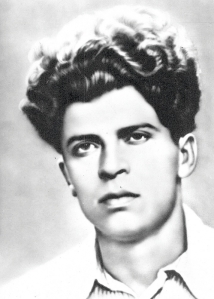
Penyo Penev
Until recently, the name Penyo Penev brought to memory a thin book with faded red covers on my grandfather’s nightstand, and little more. I knew he was a fan, and I knew that they had been classmates in a Sevlievo high school.
I only had to make an effort, to get curious, to find beyond the faded red covers a truthful, unhappy poet’s hopes, ideals and disappointments, bared in stark rhyme.
Penyo Penev was born on May 7, 1930 in the village of Dobromirka, Sevlievo municipality. He began writing in grade 3, and upon graduating in 1947, he eagerly joined the first youth brigades. These were labourer brigades, formed with an idealistic gleam in the name of implementing the new Socialist ideal in massive construction and agricultural projects. From that moment on, Penev’s life was intrinsically linked to his work as a builder, through which he experienced the practical realization of his dream of creating a new, better world. His poems reflect the optimistic outlook of the first years of Communism in Bulgaria, the notion of sacrifice for the good of future generations. While working in the new city of Dimitrovgrad, he fell in love with its fresh, idealistic outlook. He married his wife there, he had his son there, and there he experienced his most fruitful and happiest years.
Sep. 17 – Day of Sofia
17.09.2012 § Leave a comment
September 17 is recognized as the official holiday of the city of Sofia. I have written lots about Sofia, but I’d like to share a birthday gift of sorts with the city: the finalists in 8 Magazine’s “Warmth of Bulgarians” photo contest.
While you enjoy those, I should debunk a common misconception. September 17 is venerated in the Eastern Orthodox church as the day of 2-th century martyr St. Sophia, who was martyred along with her daughters Faith, Hope and Love. It is natural to assume that the city of Sofia was named after this saint. However, the city takes its name from St. Sophia Cathedral Church, which was consecrated not to Martyr Sophia, but to Hagia Sophia, the Holy Wisdom (much like Hagia Sophia in Istanbul). The fact that Sofia celebrates on Martyr Sophia’s feast day is a combination of coincidence, confabulation and confusion.
The Golden Treasure of Panagyurishte
27.07.2012 § 1 Comment
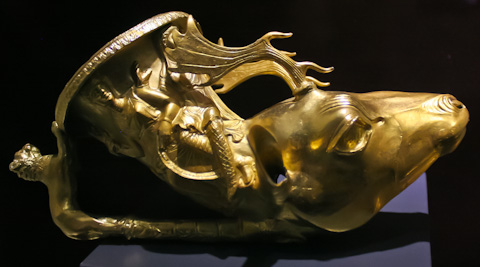
The Panagyurishte treasure, named after a tongue-twisting town in Bulgaria, is a masterpiece of Thracian worksmanship. It consists of a phiale, an amphora and seven rhytons, all made of solid 24-carat gold. The treasure weighs a total of 6.164 kg (13.5 pounds) and is arguably the single most valuable set of artifacts ever found on the territory of Bulgaria.
Care and Neglect
27.07.2012 § 2 Comments
On Veliko Tarnovo‘s main pedestrian shopping street, among the artisans and souvenir shops, stand two buildings which are not too different, really. They’re both heritage buildings, over 100 years old, both owned by private entities, and they exhibit the perfect duality of the conditions of private enterprise in Bulgaria. Yin and yang, order and chaos, careful preservation and haphazard decay. « Read the rest of this entry »
Plovdiv’s Roman Treasures: A Walking Tour
25.07.2012 § 8 Comments

In 1968, the sports field of the Pedagogy Institute in Bulgaria’s second-largest city, sun-drenched Plovdiv, was scheduled for refurbishment. A company of the Army’s construction corps was assigned to expand the field, which involved digging deeper into one of the city’s three hills. However, the Institute never got its field, because what the diggers found underneath were the curved marble seating rows of an immaculately preserved outdoor Roman theatre.
Plovdiv, inhabited continuously since 4000 BC and Europe’s third-oldest city (after Athens and Argos), is known by many names. Settled by the Thracians as Eumolpias, it was conquered by Philip II of Macedon, the father of Alexander the Great, and given the name Philippopolis. After the decline of the Macedonian kingdom, it reverted to the Thracians, who called it Pulpudeva. When the Romans swept onto the Balkans, they called it Trimontium (“City of Three Hills”) and made it a cultural and economic hub of the Roman province of Thrace. The via militaris, one of the Roman empire’s arterial roads, passed through the city, and it thrived on the banks of the Hebros (Maritsa) river, at one time containing numerous public buildings, baths, shrines, villas, with high walls and a Roman grid system in its streets. This walking tour will take you on a trip through its main Roman-era sights.
« Read the rest of this entry »
Nevena Kokanova: The First Lady of Bulgarian Cinema
18.06.2012 § Leave a comment
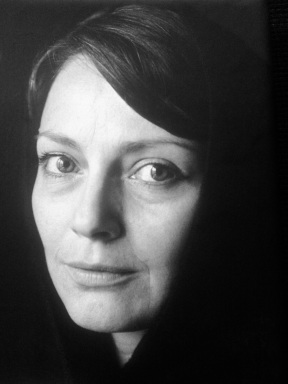
Nevéna Kókanova (Невена Коканова) was a woman of extraordinary beauty, talent and grace, who bore the laurels of stardom with humility while her face spoke volumes of love, loss and passion. But, as is often the case, the story of Bulgaria’s brightest star is really one of tumult, forbidden love and politics, a fascinating journey from beginning to end.
A Tour of Sofia in “Hitman” Movie Frames
03.06.2012 § 1 Comment
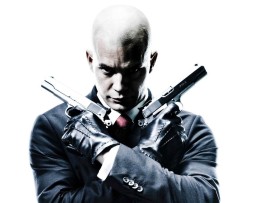 The not-terribly-brilliant 2007 movie treatment of the video game series Hitman starring Timothy Olyphant and directed by Xavier Gens is notable for being shot primarily in Sofia. The Bulgarian capital is standing in for Moscow, but, as a pedantic and shrewd movie-goer, I have extracted a few screenshots that are definitive Sofia landmarks.
The not-terribly-brilliant 2007 movie treatment of the video game series Hitman starring Timothy Olyphant and directed by Xavier Gens is notable for being shot primarily in Sofia. The Bulgarian capital is standing in for Moscow, but, as a pedantic and shrewd movie-goer, I have extracted a few screenshots that are definitive Sofia landmarks.
“Don Juan” at the National Theatre
23.05.2012 § 2 Comments
 In the dimly lit colonnade of a villa’s courtyard, a blindfolded young lady is laughingly following the call of a tiny bell in the hand of a masked gentleman. Her laughter echoes from the empty stage. Three masked figures peel away from the shadows and join their game with predatory grace. Two grab the gentleman, gag him and drag him off the stage. The third takes out a bell and lures the lady towards him. Completely oblivious, she trustingly approaches the predator calling to her with the bell of her beloved. He lunges at her and she screams in fear. Her screams attract the men from the house. Cornered and surrounded, the predator shoots the girl’s father and disappears in the ensuing chaos.
In the dimly lit colonnade of a villa’s courtyard, a blindfolded young lady is laughingly following the call of a tiny bell in the hand of a masked gentleman. Her laughter echoes from the empty stage. Three masked figures peel away from the shadows and join their game with predatory grace. Two grab the gentleman, gag him and drag him off the stage. The third takes out a bell and lures the lady towards him. Completely oblivious, she trustingly approaches the predator calling to her with the bell of her beloved. He lunges at her and she screams in fear. Her screams attract the men from the house. Cornered and surrounded, the predator shoots the girl’s father and disappears in the ensuing chaos.
Poet Profile: Valeri Petrov
20.05.2012 § 4 Comments
 Poet, playwright, screenwriter and translator, Valeri Petrov (pseudonym of Valeri Nisim Mevorah) is one of the most multifaceted talents in Bulgarian literature. In prose, verse and translation, his style is crisp, light and accessible and every rhyme underscores the beauty and melodiousness of the Bulgarian language.
Poet, playwright, screenwriter and translator, Valeri Petrov (pseudonym of Valeri Nisim Mevorah) is one of the most multifaceted talents in Bulgarian literature. In prose, verse and translation, his style is crisp, light and accessible and every rhyme underscores the beauty and melodiousness of the Bulgarian language.
« Read the rest of this entry »
Veliko Tarnovo – Bulgaria’s Medieval Capital
16.05.2012 § 11 Comments

In the foothills of the Balkan mountains, around the twists and turns of the Yantra river rise three hills: Tzarevetz, Sveta Gora and Trapezitza. Perched atop these hills and reflected in the river are the houses and castle walls of Veliko Tarnovo – the capital of the Second Bulgarian Empire and once the beating cultural heart of South-Eastern Europe.
